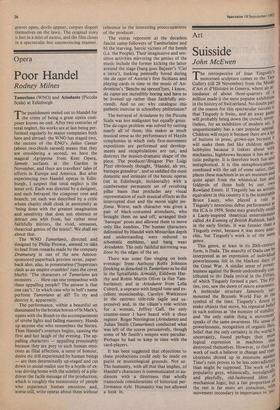Op e ra Poor Handel Rodney Milnes T he punishment meted out to
Handel for the crime of being a great opera com- poser knows no end. After two centuries of total neglect, his works are at last being per- formed regularly by major companies both here and abroad: the WNO has staged two, the success of the ENO's Julius Caesar (about two-thirds earned) means that they are considering a second, we have the magical Agrippina from Kent Opera, Semele surfaces at the Garden in November, and there are travellers' tales of efforts in Europe and America. But after experiencing two Handel operas in Edin- burgh, I suspect that total neglect .is the lesser evil. Each was directed by a designer, and each betrayed the composer root and branch; yet each was described by a critic whom charity shall cloak in anonymity as 'being done with the greatest imagination and sensitivity that does not obstruct or detract one whit from, but rather most faithfully mirrors, the vivid, sensuous, theatrical genius of the music'. We shall see about that.
The WNO Tamerlano, directed and designed by Philip Prowse, seemed to take its lead from remarks made by the company Dramaturg in one of the new Amoco- sponsored paperback preview series, paper- back also, alas, in presentation ('Superstars clash as an empire crumbles' runs the cover blurb): 'The characters of Tamerlano are monsters . . . How can one sympathise with these appalling people? The answer is that one can't.' In which case why in hell's name perform Tamerlano at all? To try and destroy it, apparently.
The performance, within a beautiful set dominated by the bronze horses of St Mark's, opens with the Bomb to the accompaniment of strobe lights and falling masonry. Hands up anyone else who remembers the Sixties. Then Handel's overture begins, causing the first and last laugh of the evening. The ap- palling characters — appalling presumably because they are prey to such human emo- tions as filial affection, a sense of honour, desire etc still experienced by human beings — are then determinedly up-staged and cut down to social-realist size by a horde of ex- tras driving home with the subtlety of a pile- driver the facile message of the production, which is roughly the monstrosity of people who experience human emotions and, worse still, write operas about them without reference to the interesting preoccupations of the producer.
The extras represent a) the decadent fascist camp-followers of Tamburlaine and b) the 'starving, heroic victims of the bomb (i.e. the People). Their imaginative and sen- sitive activities mirroring the genius of the music include the former kicking the latter around the stage (bang goes Bajazet's 'Ciel e terra'), looking pointedly bored during the da capo of Asteria's first Siciliana and playing cards in time to the music of An- dronicus's 'Benche mi sprezzi'(yes, I know, da capos are incredibly boring and have to be livened up rather than faithfully mir- rored). And so on: why catalogue this pathetic exercise in schoolboy philistinism?
The betrayal of Ariodante by the Piccola Scala was less malignant but equally gross. The da-capo problem was solved by cutting nearly all of them; this makes as much musical sense as the performance of Haydn symphonies in which only first-movement expositions are performed and develop- ments and recapitulations are cut, and destroys the musico-dramatic shape of the piece. The producer/designer Pier Luigi Pizzi obviously thought, 'Handel, ah yes, baroque grandeur', and so saddled the most domestic and intimate of the heroic operas (set in Edinburgh, incidentally) with a cumbersome permanent set of revolving pillar bases that precludes any visual representation of such musical effects as the interrupted duet and the moon night sin- fonia. Worse, each character was given a pair of black-costumed attendants, who brought them on and off, arranged their 'baroque' poses and allowed them to move only like zombies. The human characters delineated by Handel with Mozartian depth and understanding were reduced to schematic emblems, and bang went Ariodante. The only faithful mirroring was done by the edges of the set.
There was some fine singing on both evenings: from Anthony Rolfe Johnson (looking as detached in Tamerlano as he did in the Spitalfields Armide), Eiddwen Har- rhy and Robin Martin Oliver (a fine Tam- burlaine); and in Ariodante from Lelia Cuberli, a soprano with limpid tone and ex- cellent musicianship, Carolyn Watkinson in the castrato title-role (agile and ex- pressive) and, in the villain's role written for a . woman, Jeffrey Gall, the only counter-tenor I have heard with a chest register. Roger Norrington (Ariodante) and Julian Smith (Tamerlano) conducted what was left of the scores persuasively, though some of Mr Smith's tempos were peculiar. Perhaps he had to keep in time with the card-players.
It has been suggested that objections to these productions could only be made on purist or musicological grounds. Not so. The humanity, with all that that implies, of Handel's characters is communicated to au- diences with a directness that wholly transcends considerations of historical per- formance style. Humanity was not allowed a look in.


































 Previous page
Previous page